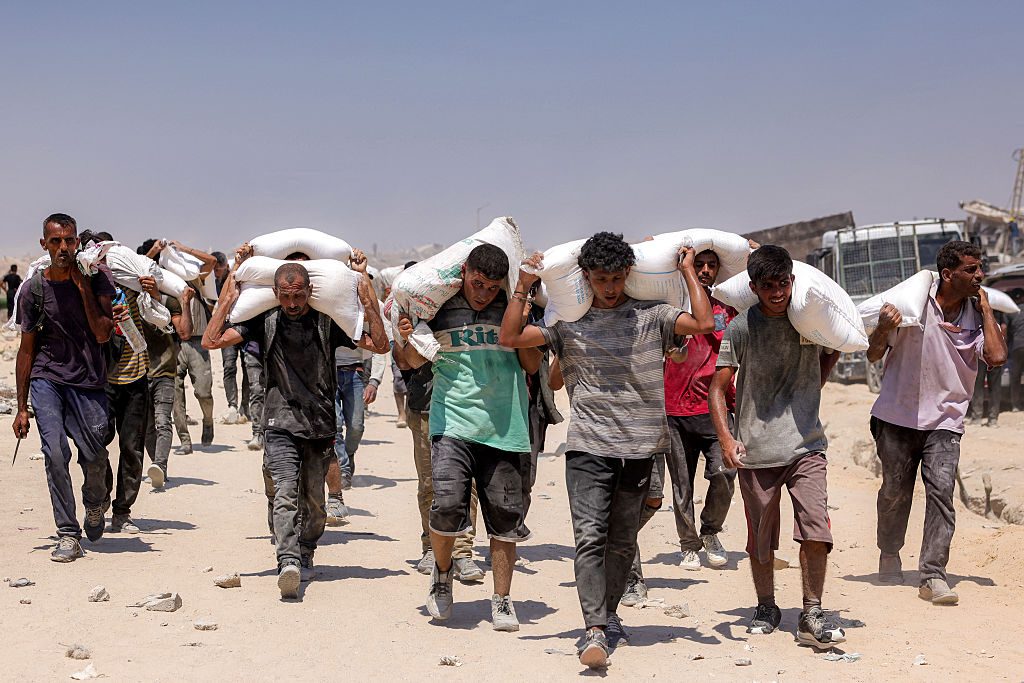Gaza
In recent days, as evidence of famine in Gaza has become impossible to ignore, Israel and some of its neighbours have begun to take steps they claim will alleviate the suffering of Palestinians. These include air drops of aid and so-called “humanitarian pauses” in Israeli attacks to allow people to collect food.
With two million people still facing extreme hunger, these gestures have made little difference. The overall increase in aid is small, and the chaotic way the operation has been organised means most still go without. My family in central Gaza are in the same position we were last week: reduced to a meagre diet of lentil soup and whatever else we manage to buy from traders who charge extortionate prices. We are not alone, for the improvement of conditions for ordinary Gazans is more cosmetic than real.
The air drops started after months of delays and restrictions on ground aid convoys. All the crossings from Israel and Egypt have been closed, bombed or heavily restricted by Israeli forces since the war began almost two years ago. The two main cargo entry points at Rafah and Kerem Shalom remain under near-constant fire, which makes it almost impossible to bring in large quantities of food, fuel or medicine by land.
This is why air drops, despite concerns over efficiency, were considered the only remaining option by some foreign governments. Yet there have been numerous incidents where falling aid boxes have hit people on the ground. At the weekend, a heavy crate fell on a tent where a displaced family was living, injuring 11 Gazans. On other occasions, the dropping of aid has caused violent chaos, as desperate citizens fight to get their hands on it.
Besan Marwan, a displaced woman living near Khan Younis, told me: “When we heard about the first air drop, we were happy and thought, at last, maybe there’s hope. But we couldn’t get anything. People were fighting, and it was very dangerous. When the drops arrive, we’re too scared to leave our tent.”
When one drop landed in Deir al-Balah, some families stopped others from coming close, and took the boxes for themselves. There was even gunfire, with nobody to organise distribution. Abdelhakim Eyad, a displaced man who was present, said: “I grabbed a box, but then the shooting started. I felt like I was in a battle, not at an aid drop.”
Shifa Al-Mabhouh, who lives in a tent in northern Gaza, told me: “There’s no system and no fairness. The aid goes to the strong or those with weapons. We just watch the boxes fall and can’t do anything.” Other drops have landed in the dangerous “red zones” where the Israeli army is present. If Gazans try to go there, it will likely cost them their lives.
Meanwhile, the humanitarian pauses are limited to just a few hours. There are no clear maps to show people where to go, and Palestinians have been killed by Israeli fire while trying to seek safety. Where we live in al-Bureij, in the central Gaza Strip, there simply isn’t a “safe” pause zone nearby. For us, they might as well not exist.
If anything, the air drops and pauses serve only to underline the fact that the international community has failed to create safe aid routes or stop the fighting in a lasting way. The people of Gaza don’t need boxes falling from the sky. What we need is a real end to the war, open roads for aid trucks, and the fair and organised distribution of food and medicine with international supervision. Rather than momentary relief, we are looking towards the international community for a just and lasting solution.










Join the discussion
Join like minded readers that support our journalism by becoming a paid subscriber
To join the discussion in the comments, become a paid subscriber.
Join like minded readers that support our journalism, read unlimited articles and enjoy other subscriber-only benefits.
Subscribe